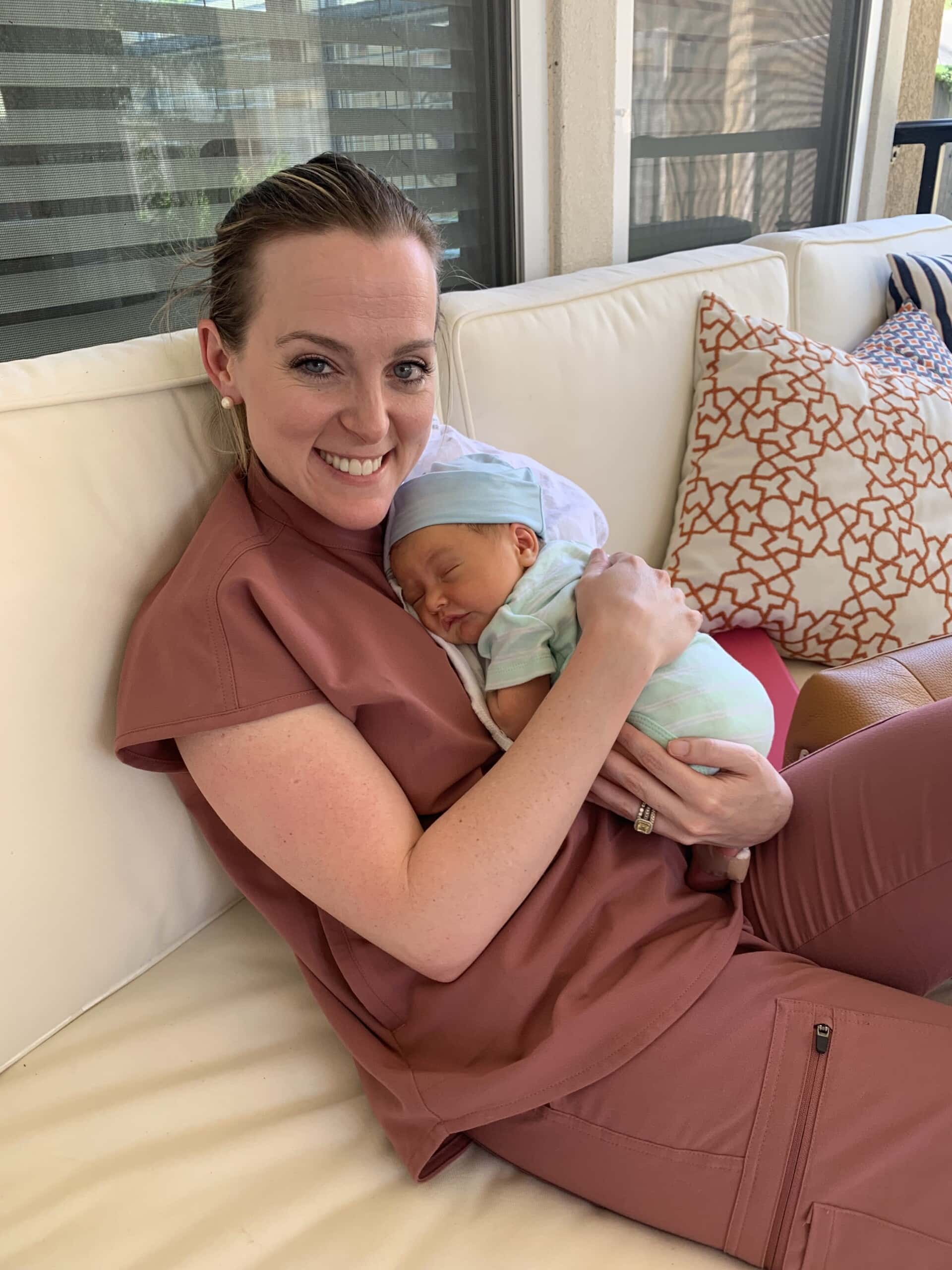Pregnancy is an incredible ride. There are many highs and lows, but the overall miracle growing inside you is truly magical. Having helped hundreds of women during their pregnancies and at their births as a doula and as a mother myself, I know that pregnancy can also be overwhelming. There is so much information available it can be a lot to take in and challenging to know where to start. Luckily more and more women are learning that help is available and are hiring doulas. But what is a birth doula? What does a birth doula do? And what can you expect if you were to hire one? I’m breaking it all down for you so you can determine if hiring a doula is a good choice for you.
What Is a Birth Doula?

A birth doula is a professional, usually a woman, who is trained in supporting women and their partners emotionally, physically, and with information throughout their pregnancy, childbirth, and immediate postpartum experiences. People may think that a birth doula’s role is only in the labor and delivery room and for couples who want an unmedicated birth, but that is not the case! The birth doula’s purpose is to help the mother and partner have a safe, informed, positive, and empowering birth experience — however that looks for the couple. This type of support can lead to happier, more satisfying experiences, which can lead to a better transition into postpartum and motherhood.1
But what does a birth doula do to help women have empowering births? We know it’s “support,” but let’s break that down and show exactly what that support looks like.
What Does a Birth Doula Do During a Woman’s Pregnancy?

Physical Support
As I mentioned, birth doulas aren’t just there for labor and delivery. They are available throughout their clients’ pregnancies, too. Pregnancy can be an overwhelming time. It’s a time of confusion—what should you do? What shouldn’t you do? How can you better prepare? What should you get? And more. A doula is there for her clients over email, text messages, and phone calls to answer their questions and reassure them of their options throughout pregnancy. Doulas also provide in-person support through prenatal visits. As for me, I offer three prenatal visits in my birth doula package, but you’ll want to ask the doulas you’re interviewing how many visits you will receive. During these appointments, doulas go over the topics mentioned. They can help families write their birth plans and teach coping techniques, comfort measures, and position changes that they can do during labor and pushing.
Educational Support
If the pregnant woman wants advice on what books to read, which classes to take, what exercises to do, which nursing bras to get, what to pack in her hospital bag, and if she should see a chiropractor—a doula can help and be specific to what that individual family needs. Also, some expecting moms want more information on delayed cord clamping, placenta encapsulation, belly binding, babywearing, etc. There is much to consider during pregnancy, and a birth doula can help you navigate it all. She can provide you with the best resources available to you so that you can skip the hours of research and make the best decisions for you and your family.
Doulas invest in their education and training, and a good doula is never finished when it comes to learning. She is always continuing her research and education and learning something new. When you hire a doula, all of the information she knows becomes available to you. She’s read the books, done the workshops, completed the training, and has been to births. She is there to give you all of the information (pros and cons, benefits, and risks) so that you can feel confident in your pregnancy and birthing journey.
Emotional Support
Not only that, pregnancy can be very emotional. Our hormones change during pregnancy, and some women experience depression and anxiety during pregnancy. Experiencing too much stress, depression, and anxiety during pregnancy can lead to unfavorable birth outcomes.2 With so much change occurring, it’s understandable that things can feel unstable, scary, and up in the air. This is when doulas provide their emotional support. She is there to listen to her clients, validate their feelings, offer them options for help, and guide them through the fog of pregnancy. A doula provides an objective listening ear and shoulder to lean on.
What Does a Birth Doula Do During Labor & Delivery?

For many doulas, labor and delivery are the “meat and potatoes” of birth doulas’ support. But before labor begins, birth doulas are on-call for several weeks before and after a pregnant person’s due date. Babies come when they want, and doulas typically are on-call when a pregnant woman is 37 or 38 weeks pregnant up until 42 weeks. She does this because she wants to ensure that she will be available, has on-call childcare ready, and can drop whatever she is doing to run to the laboring woman’s side. Whether in a movie theater, at dinner, a party, Christmas morning, a graduation, or a recital, she makes it a point to have her things with her ready in the car so she can leave at a moment’s notice to be there for her clients. And if something comes up and she can’t be there, a birth doula ensures she has a good backup doula. Whether it’s 2 am or 2 pm, a doula is there for her clients. And once she arrives, the show begins!
Educational Support
Just like in pregnancy, birth doulas provide educational support. She lets her clients know when to go to the hospital (if they are having a hospital birth), which comfort measures will help her through each phase of labor, which positions will help her most, how partners can be supportive and involved throughout the labor and birth, how the laboring woman can avoid unnecessary interventions, which medical induction methods are available to her, and so much more. Doulas understand the medical jargon the nurses and doctors are speaking and the hospital protocols. This helps them explain what is happening and why things are happening in familiar terms to their clients.
Something also helpful to remember is a birth doula does not work for the hospital or the doctor; she works for her clients. She is there to help the laboring woman and her partner know their options along the way and the risks and benefits of each option so that they can make the decisions that are best for their family. Not every family is the same, and not every family’s goals are alike, and that’s okay. A doula isn’t there to tell you how to give birth; she is there to help you give birth your way.
Emotional Support
Emotions can run high during labor! I’ve seen it as a doula and have experienced it myself as a mother. One moment a woman can be smiling and laughing, another screaming and crying. Birth doulas have been through this through their training and previous clients’ births. They know how to support families through these emotions. She understands these ups and downs are normal and knows how to provide calmness and encourage her clients through them with emotional support.
Physical Support
During labor and birth, physical support from a birth doula is nonstop. Doulas provide massage during and between contractions and counter pressure to relieve pain from the contractions. She also coaches the laboring woman with breathing techniques, helps her move into different laboring positions, does acupressure, can use aromatherapy if desired, uses hot and cold compresses to provide comfort, does guided visualization, helps women use hydrotherapy, and more. I usually leave a birth feeling sore because I am constantly moving and comforting to keep my clients as comfortable as possible.
Physical support is a massive part of what we do as birth doulas. This comforts many families because they don’t know who their nurse will be when they get admitted to the hospital or if their doctor will be on-call when they go into labor. And their nurse and doctor will not always be in the hospital room. They have other patients to attend to as well. A doula only takes on so many clients per month so that she can do her best to guarantee to support her clients during their birthing process from start to finish.
Important to Know
Typically birth doulas will meet in person with their clients once their clients are in active labor, not during the first couple of contractions. Early labor can start and stop, so doulas provide text and over-the-phone support during early labor. Once active labor begins, contractions are less likely to stop, and that’s when a doula will rush to your side. You want this because you want her to be rested. Active labor, transition labor, and pushing can take hours, sometimes days (accumulatively), and you want your doula to have energy and be ready to help!
Doulas stay with their clients providing a continuity of care throughout a woman’s labor even as nurses and doctors change shifts. Many of my clients have expressed that this consistency of presence helped them stay centered and gave them peace of mind as they were laboring.
What Does a Birth Doula Do During Immediate Postpartum?

Emotional Support
Once the baby is born, the doula’s role does not stop. Emotionally, women can begin weeping or grinning from ear to ear, beaming with joy once they meet their baby. All of those emotions are normal, and doulas are there to support moms through it emotionally. And sometimes, babies need to be taken to the NICU or an observation room for further testing and treatments. Families need support during this time just as much as they needed it during labor.
Educational Support
Educationally, a birth doula lets the mother know her options after the baby is born. She can explain the benefits of skin-to-skin, delayed cord clamping, and delayed bathing. A doula can also explain what erythromycin is, the Vitamin K shot, the Hep B shot, and what else to expect in a baby’s first 24 hours of life. She ensures that her clients are informed about all of the procedures being performed and what she can say no to. She is her advocate throughout the mother’s birthing and early postpartum journey.
Physical Support
Physically, a birth doula helps the new mom remain comfortable in bed. She helps with breastfeeding support, if the mother wants it, to help with the initial latch and good breastfeeding positioning. She can also take photos and videos of the baby, mother, and partner together; those first moments are priceless. Nurses are busy doing their job, so your doula can capture it all. She can also record all of the stats and moments of the labor and birth by writing them down for the family to keep so they never forget all of the special details.
A birth doula usually stays for the first couple of hours after birth and then lets her clients know she will contact them soon for a follow-up visit.
Postpartum In-Home Visit

Not all birth doulas offer a postpartum visit, but many do. This is when doulas come over to the client’s house and go over the whole experience. They want to hear from the mother and the partner the birth story, how she’s currently feeling postpartum, how breastfeeding or bottle feeding is going, and answer any questions they may have and provide resources should the family need more help. It’s a great visit to end the working relationship. The doula makes sure that the parents are doing well with their new little one and receives feedback that the family felt supported the whole way through.
As you can see, birth doulas do quite a bit for their clients! They have received training, read the books, and are there for their clients morning, noon, or night to help them have the experiences they desire. It’s a lot of work, but it’s oh-so worth it.
























